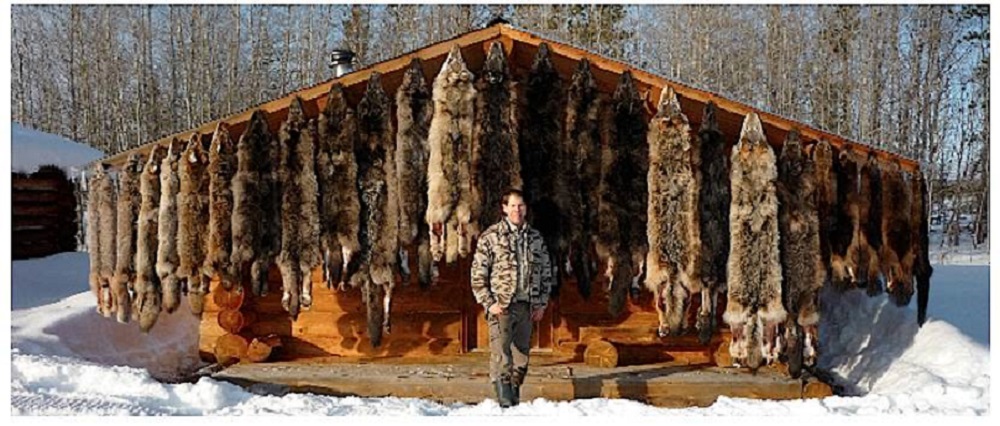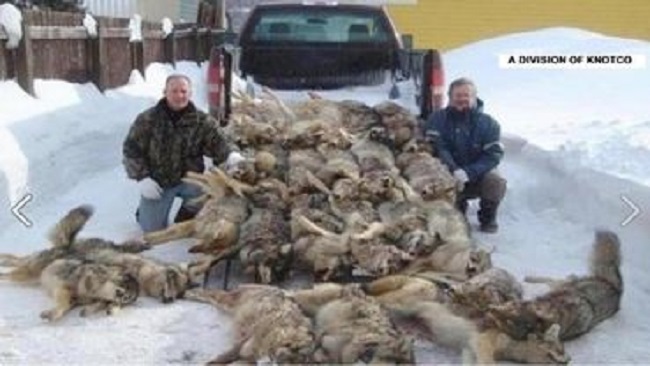For centuries, wolves have been both revered and feared by humans. These majestic animals have long served as symbols of the wild and untamed, and have played a crucial role in countless ecosystems around the world. However, in recent years, they have also become the subject of heated controversy, particularly in areas where they are hunted for sport or to control their populations. In this article, we will explore the arguments against wolf hunts and the mass killing of these creatures, seeking to understand the ecological, ethical, and economic implications of such actions. Ultimately, we will argue that coexistence, rather than elimination, is the key to a sustainable future for both humans and wolves.
Introduction: Understanding the Controversy of Wolf Hunts
Wolf hunting is a contentious issue that divides opinions sharply. While some argue that wolf hunts are necessary for safeguarding rural communities, others believe it's an outdated and ineffective method that's causing more harm than good. In this article, we will discuss the ecological importance of wolves and their impact on ecosystems. We'll also explore the ethical concerns surrounding wolf hunting and the shortcomings of using it as a method of population control.
Defining Wolf Hunts and Their Purpose
A wolf hunt is a regulated activity in which hunters pursue and kill wolves within a designated area. The primary purpose of wolf hunts is usually to reduce wolf populations, prevent livestock predation, conserve prey populations, or for recreational purposes. Some people believe that wolf hunts are necessary to protect rural communities from wolf attacks, while others see it as a cruel and outdated practice that disrupts ecosystems.
An Overview of the Controversy Surrounding Wolf Hunts
Wolf hunting is a controversial issue mainly because of the varied opinions regarding its necessity, effectiveness, and ethical implications. Wildlife conservationists, animal rights activists, and hunters all have different views on the subject. Some argue that wolf hunts are a necessary tool for managing wolf populations and protecting livestock, while others believe that wolves have a crucial role in maintaining healthy ecosystems and should be left alone.
The Ecological Importance of Wolves in Ecosystems
Wolves as Keystone Species in the Ecosystem
Wolves are apex predators that play a crucial role in maintaining balance and regulating population sizes in ecosystems. As keystone species, they control prey populations, prevent overgrazing, and encourage biodiversity. Wolves also aid in nutrient cycling and influence vegetation growth patterns, contributing to ecological health.
The Impact of Wolf Hunts on Ecosystems
Wolf hunts can have significant impacts on the ecosystems they inhabit. Removing wolves from an ecosystem can cause imbalances that affect the populations of their prey, leading to overgrazing and reduced vegetation growth. These changes can have ripple effects that disrupt the entire ecosystem, affecting other species and the ecosystem's health. For example, studies have shown that the absence of wolves has led to an increase in coyote populations, resulting in decreased songbird populations due to increased predation.
The Ethical Concerns Surrounding Wolf Hunts
The Debate over Animal Rights and Hunting
Wolf hunts raise ethical concerns due to the pain and suffering inflicted on the animals by hunters. Animal rights activists argue that animals have rights and should not suffer needlessly, while hunters believe it's a necessary part of the outdoor experience. The debate over animal rights and hunting continues to rage on, with both sides presenting valid arguments.
The Role of Tradition and Cultural Beliefs in Wolf Hunts
Wolf hunting can also be influenced by cultural and traditional beliefs. Some indigenous communities consider wolves sacred animals, while others view them as a threat to their livelihoods. Cultural beliefs can sometimes be at odds with conservation goals, making it challenging to find a middle ground where everyone's needs are met.
The Ineffectiveness of Wolf Hunts in Controlling Populations
The Persistence of Wolf Populations Despite Hunts
Despite hunting efforts, wolf populations have been shown to persist and recover from human intervention. Studies have shown that killing wolves can lead to increased breeding and larger litter sizes, making it challenging to control their populations. In some cases, wolf populations have even increased after culling, indicating that the method is ineffective.
The Role of Other Factors in Wolf Population Control
There are alternative ways to manage wolf populations that don't involve hunting. For example, non-lethal methods like electric fencing, guard dogs, and noise devices can protect livestock from predation. Furthermore, educating people on coexisting with wolves and changing grazing practices can reduce conflict between wolves and humans. Thus, it's essential to consider alternatives to wolf hunts for controlling populations.
In conclusion, wolf hunts are a contentious issue that has sparked heated debate among various groups with differing opinions. It's important to consider the ecological, ethical, and practical implications of wolf hunts before making any decisions. While wolf hunts may provide temporary solutions to problems, long-term solutions that incorporate ecosystem health, animal welfare, and human needs are crucial for sustainable wildlife management.
Alternative Solutions to Manage Wolf Populations
Every year, wolves are targeted in mass killings and hunts across the United States. But there are alternative solutions for managing wolf populations that don't involve lethal methods. One such solution is the use of non-lethal methods that focus on prevention rather than reaction. This includes fencing, guard animals, and other techniques that help deter wolves from preying on livestock.
Non-Lethal Methods of Wolf Population Management
Non-lethal methods of wolf population management have been proven effective in several locations. For instance, in Wisconsin, guard dogs have been used to protect livestock from wolves without killing any wolves. Similarly, electric fencing has been implemented in some areas, which has significantly reduced wolf predation on livestock. Non-lethal methods like these have the added benefit of reducing conflicts between wolves and farmers, and can be cost-effective in the long run.
The Importance of Coexistence Strategies
The truth is, wolves are an essential part of our ecosystem and play a vital role in balancing our natural habitats. Rather than seeing them as pests or a threat, we need to learn to coexist with them. Coexistence strategies focus on managing wolf populations through protection and understanding, rather than eradication. They include education and awareness programs, community involvement, and collaboration between wildlife managers, farmers, and advocates.
The Economic Benefits of Wolf Ecotourism
It's not just about saving wolves; protecting them can have significant economic benefits as well. Wolf ecotourism has become more popular in recent years, with travelers flocking to locations where wolves are known to exist, to view and learn about these amazing creatures in their natural habitat. Wolf touring has created jobs and tourism opportunities for rural communities, and generated revenue for local businesses.
The Rise of Wolf Ecotourism and Its Benefits
Wolf ecotourism is on the rise, with enthusiasts coming from all over the world to see these animals. In some parts of the United States, wolf tourism is contributing millions of dollars to the local economy. At the same time, ecotourism can help protect wolves, as the more people understand and appreciate these animals, the less likely they are to support practices that are harmful to them.
The Economic Impact of Wolf Hunts and Their Alternatives
On the other hand, wolf hunts can have significant negative economic impacts. The killing of wolves often leads to a decline in tourism, which can hurt rural economies. Additionally, the costs of managing wolf hunts can be high, and the money spent on lethal management could be better used to support non-lethal solutions.
The Importance of Advocating for the Protection of Wolves
To protect wolves, we need more than just non-lethal management and ecotourism. We need advocacy groups working to protect these animals from being hunted and killed. These groups play a vital role in raising awareness about the importance of wolf conservation and encouraging people to take action to protect these animals.
The Role of Advocacy Groups in Wolf Conservation
Advocacy groups play a crucial role in wolf conservation, working tirelessly to promote non-lethal methods of management and educate the public about the value of wolves in our ecosystem. They also work to influence policymakers and decision-makers to prioritize wolf protection.
The Importance of Public Involvement in Wolf Conservation
It's not just up to advocacy groups to protect wolves. The public can also play a vital role in helping protect these animals through supporting non-lethal management, promoting ecotourism, and speaking out against wolf hunts. Public involvement is essential for creating the political will necessary to protect wolves and promote their conservation.
Conclusion: Working Towards Coexistence with Wolves
Wolves are an important part of our ecosystem and deserve protection. While there are alternative methods for managing wolf populations that don't involve lethal measures, we need to focus on coexistence strategies to ensure the survival of these amazing animals. By promoting ecotourism, supporting non-lethal management, and advocating for wolf protection, we can help create a world where wolves and humans can coexist in harmony.
The Need for Collaboration and Compromise
To achieve coexistence, it's crucial that we work together to find common ground and compromise. This means collaborating with wildlife managers, farmers, and advocates to find the best solutions for protecting wolves and reducing conflicts with humans.
The Benefits of Coexistence between Humans and Wolves
The benefits of coexistence between humans and wolves are immeasurable. Coexistence promotes the protection of these essential animals and allows them to thrive in their natural habitats. It also creates economic opportunities for rural communities and promotes tourism. Through collaboration and compromise, we can create a world where wolves are part of a healthy and thriving ecosystem.In conclusion, the wolf hunt and mass killings are not only ethically questionable and ecologically damaging, but also ineffective at controlling wolf populations. Alternative solutions, such as non-lethal management and coexistence strategies, offer a more sustainable and compassionate way forward. By advocating for the protection of these magnificent creatures, and working together towards a shared goal of coexistence, we can ensure that wolves continue to play their vital role in ecosystems, and that humans can live alongside them in harmony.
FAQs
Are wolf hunts necessary for population control?
Wolf hunts are often argued as a necessary means of controlling wolf populations. However, research has shown that such hunts are largely ineffective at reducing population numbers, and can even exacerbate the problem by disrupting social structures within wolf packs. Non-lethal methods of population management have proven to be more effective and sustainable in the long-term.
What are some non-lethal alternatives to wolf hunts?
There are a variety of non-lethal approaches to managing wolf populations, including sterilization, relocation, and the use of deterrents such as fencing and noise-making devices. Coexistence strategies, such as promoting human-wolf cohabitation and education on wolf behavior, are also gaining in popularity.
Do wolf hunts have any economic benefits?
While some argue that wolf hunts can bring economic benefits through the sale of hunting licenses and tourism, research has shown that these benefits are often overstated. In fact, wolf ecotourism has been found to be a more lucrative and sustainable option, providing local communities with long-term economic benefits and fostering a greater appreciation for wolves and their role in the ecosystem.
Why should we care about the protection of wolves?
Wolves play a crucial role in maintaining the balance of ecosystems, serving as a keystone species that regulates populations of prey animals and shapes the landscape. Additionally, wolves are important cultural and historical symbols, and have a right to exist and thrive in the wild. Protecting wolves is not only an ethical imperative, but also a matter of preserving the health and diversity of our planet's ecosystems.
_______________
Here's a playlist that I am adding to all the time.
http://www.howlingforwolves.org/
BC
http://pacificwild.org/take-action/campaigns/save-bc-wolves



